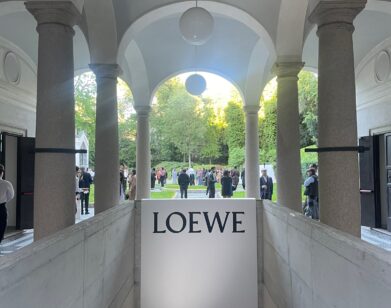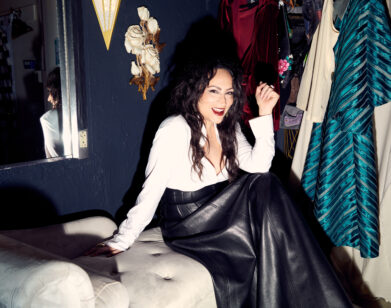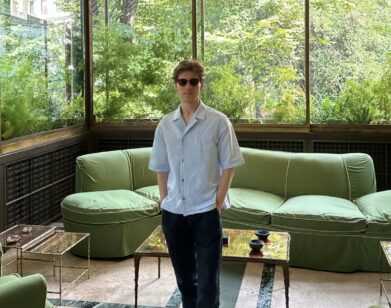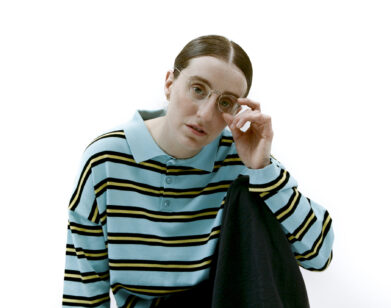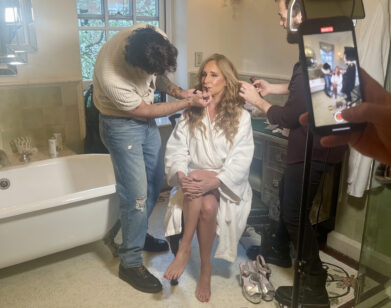Jordan Tabach-Bank Makes His Final Offer
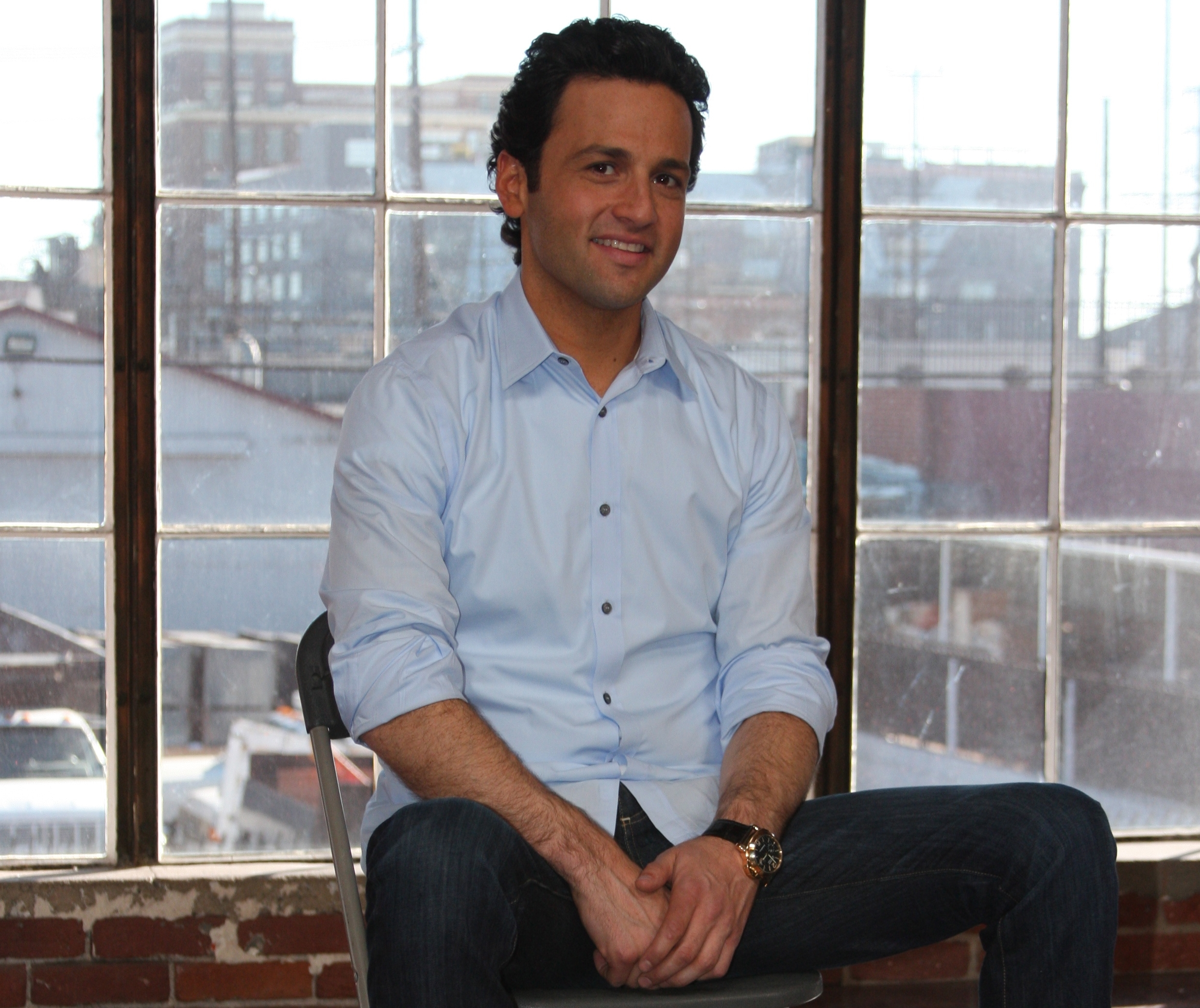
ABOVE: JORDAN TABACH-BANK. PHOTO COURTESY OF THE DISCOVERY CHANNEL.
The word “pawnshop” conjures up a certain seedy, film-noir glamour. We envision a distraught damsel ducking through some shadowy back streets and into the shop, in which she runs into a gruff Humphrey Bogart whispering to the pawnbroker.
The Beverly Loan Company is nothing like this—it may be a pawnshop, but there’s nothing shadowy or seedy about it; it’s known as “the pawnshop to the stars.” Clients are generally businessmen or celebrities, and over 90% of them retrieve the items they have pawned. As you can imagine, owner and CEO Jordan Tabach-Bank (brother of Interview‘s own entertainment director, Lauren Tabach-Bank) has seen some fascinating items come through his family company—from Oscars to Picassos and giant yellow diamonds. Tabach-Bank is currently lending his expertise to the Discovery Channel’s new show, Final Offer. Along with three other carefully selected dealers, he evaluates and bids on some rather eccentric memorabilia (think Elvis’ hair)—the catch is that each dealer’s bid is kept secret from everyone but the buyer, and whomever the buyer accepts actually has to shell out the cash. It is, in short, a gamble.
Intrigued, Interview spoke with Tabach-Bank, about his involvement in Final Offer and the realities of the pawn world.
EMMA BROWN: One thing I’m curious about is the size of the pawn world—had you run into the other dealers from the show before you started filming?
JORDAN TABACH-BANK: I’m the only pawnbroker on the show; we have an art dealer, Patrick Painter, and two auctioneers. [The producers] were looking for people who are sort of jacks-of-all-trades, and working in the pawn world, I see all kinds of items. The buy-sell world is a small world, so we all knew of each other going in, we had heard of each other. As for how big the pawn world is, to put it into perspective, there are more pawnshops in the US than McDonald’s. [laughs] But generally pawnshops are very different from my shop; we can make six-, seven-figure loans, we have private offices, and everything is extremely discreet and confidential.
BROWN: That’s interesting, because that’s not the image I have of pawnshops at all.
TABACH-BANK: Totally. There’s a stigma attached to pawn, there’s no question. One of my goals has been to debunk the stigma. Pawnshops in general are nicer than what Hollywood might portray. Our pawnshop is much nicer! [laughs] We are known as one of the most high-end collateral lenders in the United States, and collateral is just a fancy word for pawnshop. We’re actually opening a second branch in New York, in the International Gem Tower.
BROWN: Is that part of the reason that you wanted to do Final Offer, to show people the diverse array of pawnshops?
TABACH-BANK: There were so many reasons I wanted to do this show. We never wanted to shoot a television show; I’ve been approached by several producers through the years to shoot a show in our office but due to confidentiality and discretion and privacy, we never wanted to have cameras in our office showing laywers, doctors, hedge-fund managers, politicians getting loans. But Final Offer gave me the opportunity to show what we do every day—make loans and buys —and show that pawnbrokers can hang with the best of ‘em.
BROWN: Why would someone come to you instead of going to a bank?
TABACH-BANK: A lot of banks do not lend these days. [But] you could bring your diamond to us and essentially walk out with six figures in a matter of minutes. A bank is not going to make a loan against your collateral, and even if they were to, it would have to go through credit committee, there’d be a ton of paperwork, it would take to weeks to approve. Ours is one piece of paper, five minutes, cash in hand, and you’re out the door. Believe it or not, there are a lot of rich people with poor credit—millionaires who can’t get a bank loan.
BROWN: Has your business grown since the economy took a turn?
TABACH-BANK: Even in a great economy, people still utilize collateral lending institutions. Take the dot-com boom—everyone had the next great website, and they needed money to fund it.
BROWN: How do you evaluate how much a piece of memorabilia is worth? For something like awards, is there a hierarchy: Oscar, Grammy, Emmy?
TABACH-BANK: Oscars are always the most valuable; however, you can’t loan against or purchase an Oscar after the mid-1940s. Everything thereafter, the Oscar is actually on loan to the winner and owned by the Academy. We have an Oscar in loan right now that is old enough to allow us to retain it.
BROWN: What’s the strangest thing anyone’s tried to pawn?
TABACH-BANK: We’ve had such oddball items. The things that get the most money—what gets me the most excited because I can make the big loan—are GIA-certified diamonds.
BROWN: Do you seek out items—go to auctions and collect things?
TABACH-BANK: When you work in the buy-sell world, you follow it; I enjoy going to auctions. I’m personally a watch collector and an art collector. It’s not just my job, I live it 24/7. That’s why this show was such a great opportunity; it allowed me to do what I love doing and show the world what a fun job this can be.
BROWN: How many watches do you have in your collection?
TABACH-BANK: I don’t keep a large collection, but I keep a constant rotation; I get sick of a watch, I sell it, I get a new one. It’s not quantity, it’s quality and switching it up. “Variety is the spice of life.”
BROWN: What items get pawned the most?
TABACH-BANK: What we see most frequently are Rolex watches and diamond rings. On Final Offer, there’s a Discovery Channel audience, and with that comes a lot of items I would not necessarily see in my day-to-day life. I had to gamble a little. There were things that were outside of my area of expertise, [but] I like the art of negotiation and the art of the deal. This show is really well policed, there was no collusion between the dealers, it’s not like we talked about it and said “Hey, what do you think it’s worth?” We had to take a shot in the dark, on our own.
BROWN: Is it like an exam—after the episode is over, you all talk about it?
TABACH-BANK: Yeah, after we’ve made an offer. Or, if we don’t have an opportunity to make an offer, “What would you have paid for it?” After the fact, we’re like a bunch of geeky dealers discussing what happened on the exam.BROWN: How do they decide the order in which the dealers bid?
TABACH-BANK: The seller comes in with a piece—Kurt Cobain’s guitar or Elvis Presley’s hair.
BROWN: Ew.
TABACH-BANK: [laughs] Exactly. We’ve also got gemstones, a Marilyn Monroe dress, and when the seller comes in, they present it to the dealers. Depending on whether the dealers look interested, they decide what order they’re going to negotiate. There’s a little gamesmanship—as a dealer, do I say, “Hey, I really want it, make sure to come see me?” Or do I act aloof and uninterested and hope that makes them come to my room first? What I learned was, there’s no telling what these sellers are thinking. [laughs]
FINAL OFFER AIRS THURSDAYS AT 10PM ON THE DISCOVERY CHANNEL.

